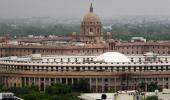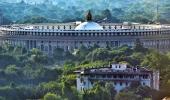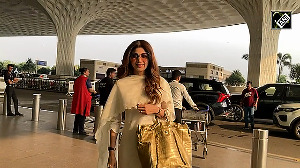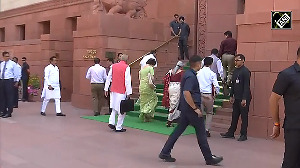The grand old Parliament building, witness to the India story as it unfolded since 1927, slipped into pages of history with proceedings shifting to the new building on Tuesday as Prime Minister Narendra Modi described it as 'Shree Ganesh' (beginning) of a new future.

From the steps towards self-rule to the dawn of Independence, and the country's emergence as a nuclear power and beyond, the old Parliament building, now called 'Samvidhan Sadan', has been a constant in the country's journey for almost a century.
Modi's suggestion to name the old Parliament building as 'Samvidhan Sadan' was accepted by Lok Sabha Speaker Om Birla, who made an official announcement to the effect.
The Lok Sabha Secretariat also formally notified the new building as the Parliament House of India.
The hallowed precincts of the old Parliament have witnessed lively debates on the making of Constitution, the poignant scenes after the announcement of the death of Mahatma Gandhi and the thumping of desks when the then prime minister Indira Gandhi announced the unconditional surrender of Pakistan forces in Bangladesh.
The heartfelt speeches of first prime minister Jawaharlal Nehru, the calm but firm resolve of Lal Bahadur Shastri, the eloquence of Indira Gandhi, the poetic brilliance of Atal Bihari Vajpayee and the powerful oratory of Narendra Modi have reverberated through the chambers of Parliament.
The foundation stone of the colonnaded building was laid by Prince Arthur, the Duke of Connaught in 1921, and the building was inaugurated on January 18, 1927.
"Today you meet for the first time in your new and permanent home in Delhi," Lord Irwin, the Viceroy, told the first session of the third legislative assembly on January 24, 1927.
"In this chamber, the Assembly has been provided with a setting worthy of its dignity and importance, and I can pay its designer no higher compliment than by expressing the wish with that the temper, in which the public affairs of India will be here conducted, may reflect the harmony of his conception," he said.
Pandit Madan Mohan Malviya, Muhammad Ali Jinnah, Pandit Motilal Nehru, Lala Lajpat Rai, C S Ranga Iyer, Madheo Srihari Aney, and Vithalbhai Patel, among others, were the members of the third legislative assembly.
Through the Government of India Act, 1919, the British had started allowing greater participation of Indians in the government.
Two years later, revolutionaries Bhagat Singh and Batukeshwar Dutt hurled bombs in the Assembly chamber from the public gallery after the House had passed the controversial Trade Disputes Bill.
'At this stage two bombs were thrown from the Visitor's Gallery, and burst among the benches occupied by the official members, causing injury to certain members. Confusion prevailed and Mr President retired. After a few minutes, Mr President resumed the Chair,' according to the official report of the proceedings of the Legislative Assembly of April 8, 1929.
Vithalbhai Patel was the then president of the Legislative Assembly, a post which came to be known as the Speaker as parliamentary democracy evolved in the country.
On the eve of Independence, the Constituent Assembly met at 11 pm with president Rajendra Prasad in the Chair.
Sucheta Kriplani, a member from Uttar Pradesh, sang the first verse of Vande Mataram to mark the opening of the special session.
Prime minister Jawaharlal Nehru delivered his famous 'tryst with destiny' speech which was followed by a pledge by members of the Constituent Assembly dedicating themselves to the service of the nation.
Speaker G V Mavlankar announced the death of Mahatma Gandhi at a sitting of the Lok Sabha on February 2, 1948.
"We are meeting today under the shadow of a double calamity, the sad demise of the tallest man of our age who has led us from slavery to independence and the reappearance of the cult of political violence in our country," Mavlankar said.
"A glory has departed and the sun that warmed and brightened our lives has set and we shiver in the cold and dark," Nehru said.
It was from the same House that prime minister Lal Bahadur Shastri made an appeal to the country to skip one meal every week as India struggled with food shortages and fought a war against Pakistan in 1965.
When the Lok Sabha met after the imposition of Emergency in 1975, the House witnessed protests from several members against the government's move to suspend private members' rights to raise issues in the House.
Deputy home minister F H Mohsin placed the Proclamation of Emergency made by the President when the Lok Sabha met on July 21, 1975.
Lok Sabha members Somnath Chatterjee, Indrajit Gupta, Jagannathrao Joshi, H N Mukherjee, P K Deo protested the suspension of their rights.
"It may be the swansong for democracy but I have to say and I say with all the emphasis at my command that when there is no specific rule to give blanket power for suspension of this nature, it cannot be admitted," Deo, a member of Swatantra Party from Kalahandi, said.
With the country's politics entering the coalition era in 1989, Parliament witnessed frequent change of governments till 1998, when the BJP formed a coalition under prime minister Atal Bihari Vajpayee.
Within a year, the Vajpayee government fell after losing the vote of confidence in the Lok Sabha by a single vote on April 17, 1999, only to be re-elected in the subsequent general elections.
In 1974, prime minister Indira Gandhi made a detailed statement in Parliament on July 22, apprising the House of the 'peaceful nuclear experiment' at Pokhran and reaction of other countries to it.
Almost 24 years later in 1998, prime minister Atal Bihari Vajpayee declared India as a nuclear weapons state after scientists carried out five underground nuclear tests on May 11 and May 13 that year.
"India is now a nuclear weapon state. This is a reality that cannot be denied, It is not a conferment that we seek; nor is it a status for others to grant. It is an endowment to the nation by our scientists and engineers. It is India's due, the right of one-sixth of humankind," Vajpayee said.
He also announced a no-first use policy, seeking to assure the world that was caught unawares about the tests.
In 2008, prime minister Manmohan Singh launched a forceful defence of his coalition government during a vote of confidence after the Left parties withdrew support following differences over the nuclear deal with the United States.











 © 2025
© 2025